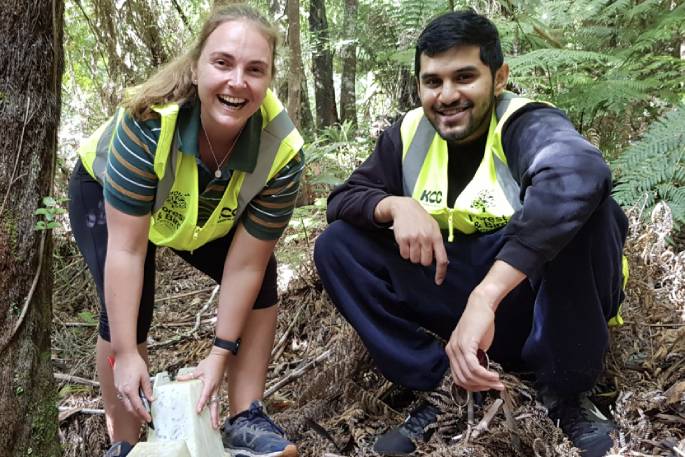An upcoming 'Volunteer Saturday' for anyone keen to help with restoring forest and birds in the Kaimai Range has had to be postoponed due to the recent storms.
"We've had confirmation that Aongatete Forest is closed to the public while DOC deal with the tree fall and track damage," says Aongatete Forest Project Deputy Chair Karen Smillie.
"Post Cyclone Gabrielle, they've closed Bay of Plenty public conservation land as a precaution until they've had a chance to check that there is no health and safety risk, such as a tree fall."
Karen says that the Department of Conservation carried out an assessment at Aongatete Forest on Tuesday.
"We will be postponing Volunteer Saturday this weekend, but don't yet have a new date," says Karen.
An extensive network of traps and bait stations are maintained year-round by Aongatete Forest Project volunteers ensuring that pests are prevented from destroying native bush.
The plan on Saturday was to retrieve any uneaten diphacinone from the bait stations to both clear the forest of toxin and assess the uptake, says Aongatete Forest Project Field Manager Helen Saville.
"The two key reasons this needs to be done is to measure how much diphacinone was eaten and where, and to remove residual bait from the bush."
.jpg)
Rats and hedgehogs eat native lizards and invertebrates, and forage bird nests for eggs. Rats are prey for stoats, ferrets and feral cats – attracting them to the bush, where they also prey on native species. Possums are a problem throughout the Kaimai, stripping the forest of much of its foliage and also raiding bird nests. In fact, possums have eaten so much vegetation that their favourite plants are now gone or going.
'The holes created in the canopy make tall trees like tawa vulnerable to being knocked over in the wind. As new seedlings and saplings grow, deer mow the forest floor clean, leaving bald patches,” says Helen.
The Aongatete Forest Project is a volunteer group that manages 500 hectares of native forest in the Kaimai Mamaku Conservation Park, between Tauranga and Katikati. Aongatete Forest Restoration Trust was established in 2006 by Tauranga Forest and Bird and the Katikati Rotary Club and is supported by local volunteers and Ngai Tamawhariua who have the kaitiaki/guardianship role over this forest.
.jpg)
An Aongatete Forest Project volunteer. Photo: Aongatete Forest Project.
Aongatete Forest Project has been nominated for the 2023 Sustainable Future Award in the People's Choice Awards with TECT Western Bay Community Awards. Voting runs online from February 20 – March 10.
To date, 65km of bait lines have been cut into the bush, with a little over 1000 bait stations attached to trees. A ring of DOC 200 stoat traps encircle the perimeter, and A24 self-resetting traps feature in specific, harder to reach locations. A dense network of Timms traps for possums can be found inside the Short Loop.
The work required to keep the pest control network active and effective is very hands on
- Adding and removing baits in the bait stations
- Checking and removing carcasses from the traps
- Regular monitoring for rodents using tracking tunnels
- Maintaining the access to each bait line (clearing tree fall, marking trails)
- Repairing the assets themselves installed in the forest… there's plenty keeping us busy!
Up to four baiting operations are run annually, with hand placed poisons in bait stations that target rats or possums. The Project runs a tight ship and no toxins are left in the bush longer than necessary. All bait stations are revisited to remove uneaten bait and records of bait take are kept.
'It's not just pest control that features strongly in our restoration programme, there's an ongoing species reintroduction effort,” says James Denyer, chairperson of the trust.
'This has included a king fern (Ptisana salicina) protection enclosure that was built with the support of the Tauranga Deerstalkers Association and DOC.”
Annual bird counts also take place.
'Restoration of the Aongatete forest ecosystem requires pest control, and it's making a difference. Compared to when the Project started, bird numbers are up – rifleman have reappeared and robin are common. The volume of insects has increased dramatically, which means more food for birds. With fewer possums, more green shoots, flowers and fruit can survive, feeding the native inhabitants and giving the forest's natural regenerative processes a chance to work.”
.jpg)
An Aongatete Forest Project volunteer. Photo: Aongatete Forest Project.
As the Project works on Department of Conservation land, the trustees create an annual agreed Operating Plan that sets out in detail the scope of their efforts, supported by appropriate policies and procedures. Health and safety is an important aspect, to ensure all volunteers have an enjoyable experience.
As always, the group's activities in the bush are weather permitting, and volunteers are asked to check their website or their Facebook page for advice on postponements and cancellations.
'We love seeing new faces, so if you're keen to volunteer, please get in touch – make sure you check out our Get Involved page for all the details, including how to register before you come out to the forest.”
Aongatete Forest Project is at 16 Pikirangi Road, at the end of Wright Road in Aongatete. The forest is only a 30 minute drive from Tauranga, and 20 minutes from Katikati. A public carpark is situated below the Project's kohanga. Access to the forest tracks, which are under the control of the Department of Conservation, start from the carpark.
Volunteer Saturday which was due to be held on Saturday February 25 has now been postponed until further notice.
.jpg)
Aongatete Forest Project volunteers. Photo: Aongatete Forest Project.



0 comments
Leave a Comment
You must be logged in to make a comment.